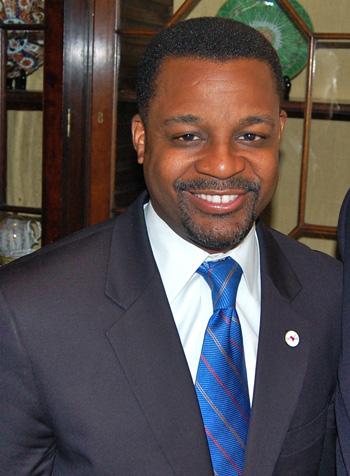The District of Columbia Government is beginning to resemble a three-legged or four-legged man these days.
Another shoe dropped this week in a year when the sound of shoes dropping is beginning to sound like a hail-storm.
D.C. Council Chairman Kwame Brown, once considered a future mayor by many political observers for his considerable political skills and popularity, was charged with bank fraud June 6 after a lengthy federal investigation of his 2008 campaign. Brown was charged with bank fraud after prosecutors said he had falsified records while applying for a home loan and to buy a powerboat. Brown, in a written statement, resigned from his post in the wake of the charges the same day.
All of this was after a hectic day, June 5, when Brown was busy making changes to committee assignments, sparking rumors of his resignation, which he insisted were not true. On Tuesday, Brown said he would not resign. On Wednesday, he did.
The charges—Brown is expected to be at a plea hearing Friday—and the resignation sent shock waves through not only the city but the council itself, still recovering from indictments and guilty pleas by two of Mayor Vincent Gray’s campaign aides and the conviction of Ward 5 Councilman Harry Thomas on charges of using his campaign donations for private purchases. A special council meeting, led by Ward 3 Council Member Mary Cheh will be held June 13 to determine who will be named interim council chairman, to be chosen from the ranks of the councils at-large members.
That would be Michael Brown, David Catania, Phil Mendelson and Vincent Orange.
The city still awaits the possible of further indictments, admissions and/or charges in the ongoing and continuing investigation of Gray’s campaign, which might further muddy the political waters and reputation of the District of Columbia.
Both Thomas and Brown, when they arrived on the council, were considered gifted politicians: one with a prominent political pedigree taking over his father’s seat in Ward 5; the other, a popular and ambitious local political leader.
Early on, Brown had already given signs that perhaps he was not ready for prime time in his financial affairs—he had a huge credit card debt, spent lavishly and then became embroiled in wanting to have a “fully loaded” SUV for his use as chairman.
Brown admitted his mistakes—the public ones—but the cloud that hung over him and his 2008 campaign made him less effective as chairman than he could have been, after besting Orange for the chairmanship spot. The questions—as they are for Gray—always remained, and Brown tried to brush them aside.
Apparently not this time, because the charges were framed in a “criminal information” document, according to reports, which meant that Brown consent to the filing.
The irony—and there are many, many ironies in the affairs of this non-state—is that Brown would have been next in line to succeed Mayor Gray if he were to leave office, an outcome that is now being whispered about, depending on what else might happen. So far, the mayor has refused to talk about the investigation on the advice of his attorney.
Gray issued a statement in which he described himself as “shocked, disappointed and saddened.”
He said, in one report, that “never would I have imagined something like this would occur.”
A year ago, or two years ago, most of the District could not have imagined the current state of disarray of the District government. Now, the level of shock is still high, but perhaps we are no longer surprised.
The resignation of Brown will ultimately lead to an interim chairman, but also a special election, to replace him. The next mayoral election is in 2014, and speculation, as well as activity, about who will be running has already begun. Now, you can add speculation about who will run for chairman in a special election or the next election.


